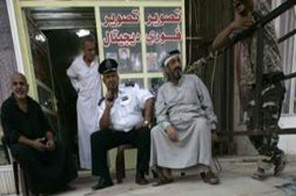Worst Iraq violene since US-pullout
BAGHDAD: Bombings killed more than 40 people in Iraq on Thursday in the worst violence since U.S. combat troops withdrew from urban areas last week, and American forces released five Iranian officials suspected of aiding Shiite insurgents.
U.S. officials said they believe the Iranians, detained in northern Iraq in January 2007, had facilitated attacks on American-led forces but handed them over to the Iraqi government at its request. Iraq's foreign minister, Hoshyar Zebari, said it was a "good initiative" that could encourage dialogue between Washington and Tehran, which are longtime foes.
The Iranian Embassy said it expected to receive the Iranians, described by their government as diplomats. Washington believes they are members of the Quds Force, part of Iran's powerful Revolutionary Guard Corps.
The carnage within Iraqi borders Thursday was a reminder that insurgents remain intent on destabilizing Iraq as the United States shifts its focus to the war in Afghanistan. Attacks are down sharply from past years of war and militants have been driven from many strongholds, but they routinely inflict casualties in Baghdad and northern Iraq, a cauldron of ethnic and sectarian tension.
In a statement on his Web site, Iraqi President Jalal Talabani condemned the attacks and said the "forces of evil and terrorism" were trying in vain to demoralize Iraqi security forces and the civilian population.
Some 130,000 U.S. troops remain in Iraq, but they have a much lower profile and are preparing for a complete pullout by the end of 2011. Iraqi attitudes are mixed, with some rejoicing over the absence of American troops in their streets and a new sense of sovereignty, and others worried that extremists will now have more freedom to operate.
"Our security forces are still weak, with poor intelligence," said Saeed Rahim, a government employee in Baghdad. "Deploying more unqualified troops into the streets does not necessarily lead to better results."
The day's violence began at 6:30 a.m., when a suicide bomber in a police uniform and carrying a radio and a pistol knocked on the door of an investigator in the anti-terrorism police force in the northern city of Tal Afar. When the officer opened the door, the bomber detonated his explosive belt, killing the officer, his wife and son, said Maj. Gen. Khalid al-Hamadani, police chief of the northern Ninevah province.
As people gathered in the aftermath, another suicide bomber detonated his explosives belt, al-Hamadani said. The coordinated attack killed a total of 34 people and injured 70. Army Brig. Abdul-Rahman Abu Raghef said the first suicide bomber was a local resident who had been jailed for one year on suspicion of terrorism, but was released in an amnesty in June.
A day earlier, car bombs in two Shiite villages near Mosul, another northern Iraqi city, killed 16 civilians and injured more than two dozen.
Haneen Qaddo, a lawmaker representing Shiites in the Mosul region, complained about a "big security vacuum" in the north and said Kurdish forces, known as peshmerga, should withdraw from some areas and allow Iraqi army units to deploy. Tensions between Iraqi Arabs and Kurds, who run a virtual mini-state in part of northern Iraq, are considered a major threat to long-term stability.
Insurgents also struck Baghdad on Thursday morning, detonating roadside bombs that killed nine people and injured dozens. Six of them died and 31 were injured in coordinated blasts near an outdoor market in the Shiite district of Sadr City, said Maj. Gen. Qassim al-Mousawi, spokesman for the city's operations command center.
Hassan Abdullah, a vegetable salesman, said he heard the first blast and went to see what was happening when a second bomb hidden in trash about 100 yards away exploded. He was taken to a hospital with hand and leg injuries.
In the Karrada district of central Baghdad, one civilian died in a bomb attack on the convoy of Central Bank Gov. Sinan al-Shibibi, a police officer said on condition of anonymity because he was not authorized to speak to the media. The governor was unharmed.
In Washington, State Department spokesman Robert Wood said the five Iranian detainees had been turned over to Iraq at its request. Another State Department official said the Iranians were members of the Quds force, which is believed to be involved in training Iraqi militant groups, and that the handover was not part of a deal or prisoner exchange with the Iranian government.
The official spoke on condition of anonymity because of the sensitivity of the information.
A senior Iraqi government official said on condition of anonymity that the Americans had advised Iraqi counterparts that the Iranians should leave the country.
Also Thursday, the U.S. military said it was investigating the death of a U.S. soldier who had been found "unresponsive" on a military base.






